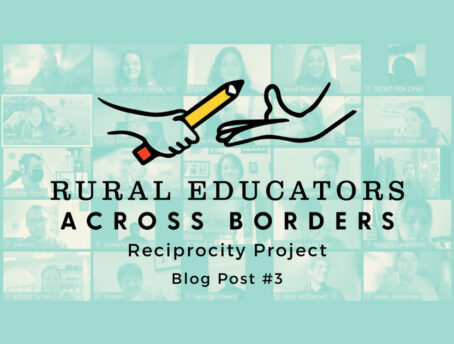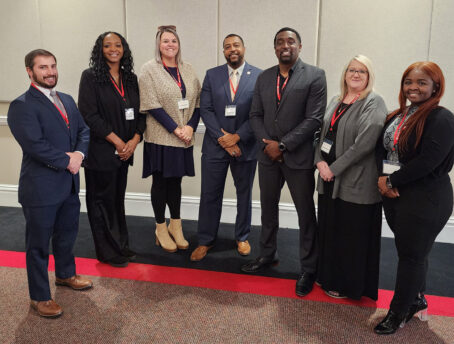The importance of teachers as leaders and pillars of rural communities remains as important as ever. Rural teachers are foundational in helping students discover their futures, not just in a career, but their place in the communities in which they teach. For seven years, Rural Schools Collaborative and the National Rural Education Association have been spotlighting rural teachers, telling stories of vocation, mastery, and pride. As the new year begins, join the RSC team in looking back and celebrating many teachers who have shared their stories and perspectives on being a rural teacher.
The longstanding goal of the I Am A Rural Teacher Project has always been to spotlight and elevate the voices of rural teachers. Many narratives, often focusing on limitations and challenges, persist around teaching generally and especially in rural places. And yet, those narratives do not reflect the lived experiences of so many who wake up every morning and choose to serve their rural communities through education. Through elevating the voices of rural teachers, RSC hopes that rural teachers, leaders, and communities around the country (and world!) will take pride in their schools, teachers, and students.
In their own words, rural teachers see that same value in having their stories shared, on scales local, national, and international:
“We need to have more voice. We need to have more voice from teachers, we need to have more voice from support staff. We need to have more of these opportunities where we can acknowledge the problems and work together to address them.” - Ty White, AZ

“Our postcard’s pretty good here, and instead of sending postcards from other communities, so many kids come back. Kids are hurrying to get through college to get back here to work because so many of them know that this is a place they want to raise their kids.” - Jenny Maras, MN
“My coming out is so deeply connected to my classroom. I want my kids to feel represented, I want my kids to feel loved, and I want my classroom to be a space where they could get to be who they want to be.” - Clint Whitten, VA
For emerging educators, teaching rurally was paramount to finding themselves as a professional, and the community assets of rural landscapes supported them along their journey to teaching.
“Especially for a young person who's entering into the field and looking for an opportunity, rural education is a very important opportunity to refine your craft, have the support of the administration, and to be given the flexibility and freedom to pursue your professional interests.” - Joe Hennessey, ME

“I've only been in education two years, but in those two short years I've made so many more connections probably than I did in the 20 years prior.” - Jennifer Shealy, AL
“I had this dream of going to school, becoming a business attorney, leaving Arkansas, and doing all these great things, but life just didn't work out that way. I ended up working at a day habilitation. I was just drawn to going into the classroom and just interacting with the children. And that's how I ended up in teaching.” - Freda Calloway, AR
“I began coaching football under the legendary coach, Dean Taylor, who was also a fabulous social studies teacher. After working with him for 2 years, he convinced me that I belonged in teaching, so I followed his advice. He was right.” - Dave Perry, MN
Central to their development as teachers and finding belonging in the community are the relationships that teachers form with their students, families, and fellow staff. The tight-knit nature of small towns can be difficult to entry initially, but can also foster deeper relationships and connections in rural communities and schools:

“ For me, being rural means being a part of a small community. I’ve lived in a small town my whole life, and although I have visited big cities and lived in a metropolitan area while I was in college, there is nothing quite like a small town. The connection, familiarity, trust, loyalty and love for one another is what makes a rural community so special.” - Cole Carter, IL
“I feel that through connections and government intervention at least I have some hope and a vision that I see a big cooperation here in my village, that most of the learners go to school and keep in school...When you educate the whole community, you have done a very big percentage of developing transformation. ” - Fredrick Mugalula, Uganda
“In a school setting...you can be multiple things to a student at the same time; you can be their teacher, but then they see you in the community as a community leader, but then at the end of the day, you were the person that graduated with their mom and dad. When you grow up in a small community...there's always someone there who has your back. ” - Candace Cain, NE
The COVID-19 pandemic thrust astronomical challenges onto rural communities, schools, teachers, and students. Exacerbating the issues in rural communities is a lack of consistent broadband internet access, which made it difficult to transition learning to home. The strength, creativity, and resilience of teachers highlighted the capacity of rural communities to persist through hard times:
"I believe our community is one of the best. Our superintendent, administrators, and teachers have all gone above and beyond to make sure our students stay on track, the best they can. You can, literally, feel the love the teachers sent home with kiddos as they walked out for, quite possibly, the last time.” - Tracy Orr, IL
“We had 48 hrs notice to close from the Government. We had recently got a new Xerox machine so we put it into action and set about printing resources for those who did not have access to a printer at home. My teachers have done an amazing job getting to grips with this new approach.” - Russell David, UK

"Are things perfect, no, but I am really proud of everything our staff, parents, and community are doing to make this work. I am proud of the way the community has banded together to help everyone get through this and I am especially proud to be a Bloomfield Bee!" - Lee Ann Runyon, NE
“On top of being rural, we're very remotely located. It's hard to get our students to places where they can maybe have an experience outside of the school. One of the blessings of the pandemic was so many places making virtual visits available.” - Kymberli Wregglesworth, MI
The pride in place, and development of local assets, is a feature that many teachers note in why they teach in rural settings. Be it physical beauty, dedicated community members, or closer access to local resources, teaching rurally fosters a connection between people and place in both teacher and student.
“I think home is sometimes a place, sometimes it's a person, sometimes it's a feeling. But it's that sense of belonging that you create, when you connect with things. And that's what I try to do with teaching, that's what I try to do with my community service work, and it’s what I always tried to do with my writing.” - Kim McCully-Mobley, MO

“What I like about place-based education is that it can be a context for a lot of different subject areas. It's very amenable to interdisciplinary learning. And so I think that's just kind of been there the whole time.” - Skylar Primm, WI
“When I see this place, I am just in awe at how physically beautiful it is. There is snow and ice for miles, and it is the quietest, most serene place that you will ever see.” - Robbin Perkins Askew, AK
These selected quotes are just a few of the powerful words given by rural teachers to RSC over the years. By sharing these interviews, and illuminating their stories, RSC is excited to continue highlighting the pride of place and profession shared by so many rural educators. It is important for everyone, teachers included, to see themselves represented in narratives, news, and stories.
We invite readers to return to any interviews and stories that they fondly remember, may have missed, or are intrigued by from the quotes above. Thank you to those who have shared their stories with us along the way, and thank you for all you do for your rural students & communities. If you know a rural teacher who you think should be spotlighted, please reach out to RSC and nominate them. And if you know a rural teacher in your life, share these stories with them, as a reminder that they are loved, seen, and essential to the well-being of rural communities everywhere.
Special thanks to Hailey Winkleman (Carmi, IL) who supported the I Am A Rural Teacher project since inception, and whose work and research were adapted for this article. Rural Schools Collaborative, the National Rural Education Association, and the I Am A Rural Teacher Project would not be here today without her!




